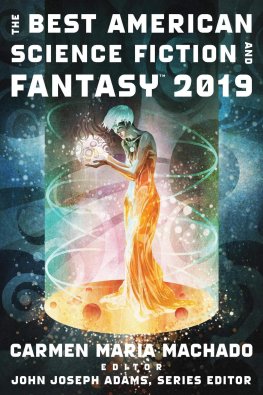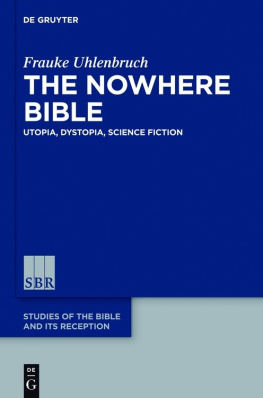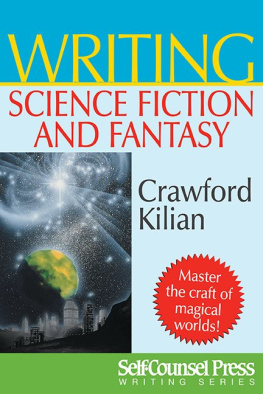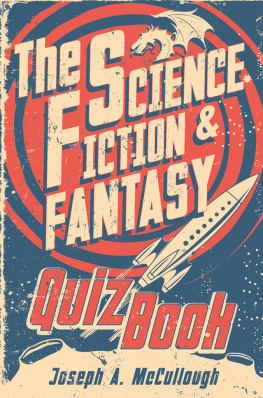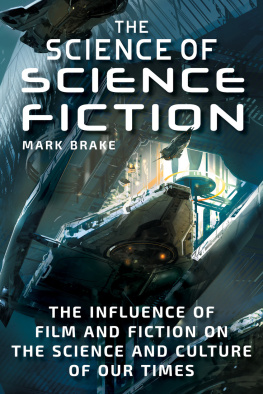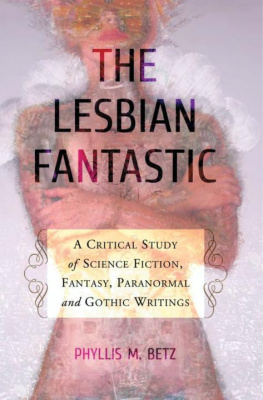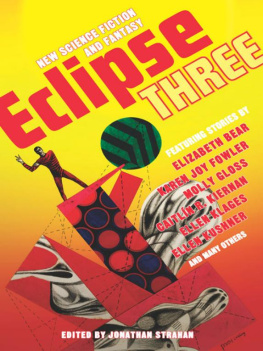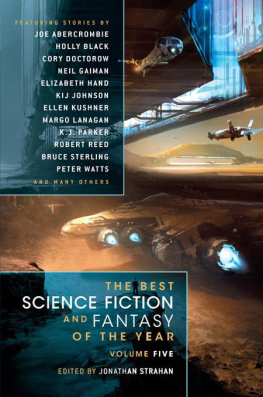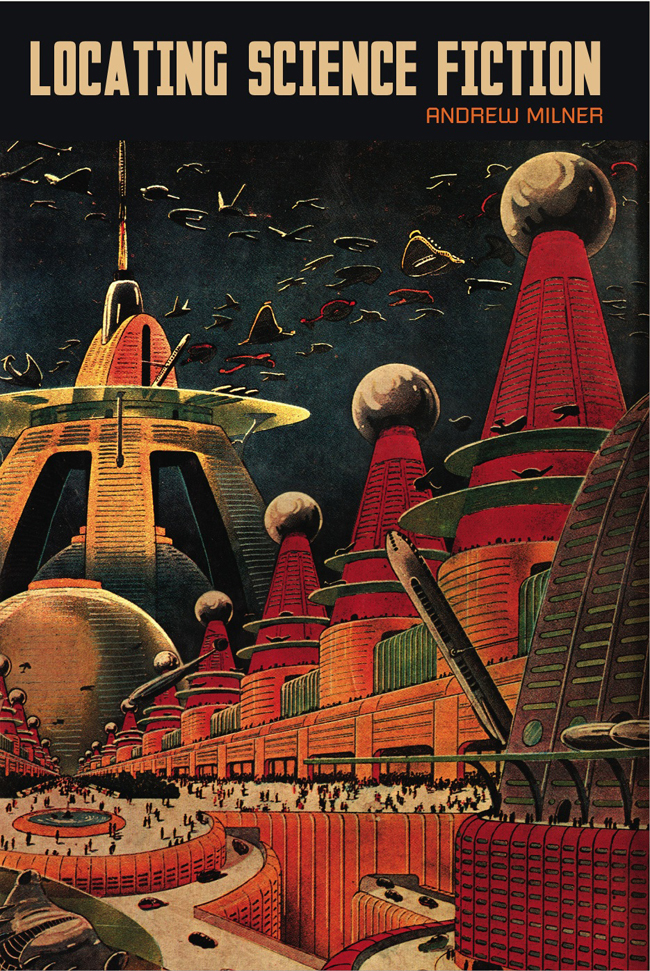Locating Science Fiction
Liverpool Science Fiction Texts and Studies, 44
Liverpool Science Fiction Texts and Studies
Editor David Seed, University of Liverpool
Editorial Board
Mark Bould, University of the West of England
Veronica Hollinger, Trent University
Rob Latham, University of California
Roger Luckhurst, Birkbeck College, University of London
Patrick Parrinder, University of Reading
Andy Sawyer, University of Liverpool
Recent titles in the series
22. Inez van der Spek Alien Plots: Female Subjectivity and the Divine
23. S. T. Joshi Ramsey Campbell and Modern Horror Fiction
24. Mike Ashley The Time Machines: The Story of the Science-Fiction Pulp Magazines from the Beginning to 1950
25. Warren G. Rochelle Communities of the Heart: The Rhetoric of Myth in the Fiction of Ursula K. Le Guin
26. S. T. Joshi A Dreamer and a Visionary: H. P. Lovecraft in his Time
27. Christopher Palmer Philip K. Dick: Exhilaration and Terror of the Postmodern
28. Charles E. Gannon Rumors of War and Infernal Machines: Technomilitary Agenda-Setting in American and British Speculative Fiction
29. Peter Wright Attending Daedalus: Gene Wolfe, Artifice and the Reader
30. Mike Ashley Transformations: The Story of the Science-Fiction Magazine from 19501970
31. Joanna Russ The Country You Have Never Seen: Essays and Reviews
32. Robert Philmus Visions and Revisions: (Re)constructing Science Fiction
33. Gene Wolfe (edited and introduced by Peter Wright) Shadows of the New Sun: Wolfe on Writing/Writers on Wolfe
34. Mike Ashley Gateways to Forever: The Story of the Science-Fiction Magazine from 19701980
35. Patricia Kerslake Science Fiction and Empire
36. Keith Williams H. G. Wells, Modernity and the Movies
37. Wendy Gay Pearson, Veronica Hollinger and Joan Gordon (eds.) Queer Universes: Sexualities and Science Fiction
38. John Wyndham (eds. David Ketterer and Andy Sawyer) Plan for Chaos
39. Sherryl Vint Animal Alterity: Science Fiction and the Question of the Animal
40. Paul Williams Race, Ethnicity and Nuclear War: Representations of Nuclear Weapons and Post-Apocalyptic Worlds
41. Sara Wasson and Emily Alder, Gothic Science Fiction 19802010
42. David Seed (ed.), Future Wars: The Anticipations and the Fears
43. Andrew M. Butler, Solar Flares: Science Fiction in the 1970s
Locating Science Fiction
ANDREW MILNER
LIVERPOOL UNIVERSITY PRESS
First published 2012 by
Liverpool University Press
4 Cambridge Street
Liverpool
L69 7ZU
Copyright 2012 Andrew Milner
The right of Andrew Milner to be identified as the author of this book has been asserted by him in accordance with the Copyright, Designs and Patents Act 1988.
All rights reserved. No part of this book may be reproduced, stored in a retrieval system, or transmitted, in any form or by any means, electronic, mechanical, photocopying, recording, or otherwise, without the prior written permission of the publisher.
British Library Cataloguing-in-Publication data
A British Library CIP record is available
ISBN 978-1-84631-842-9
ePub eISBN 978-1-78138-921-8
Typeset by XL Publishing Services, Tiverton
Printed and bound by CPI Group (UK) Ltd, Croydon CR0 4YY
For the five fabulous Milner boys,
Liam, Robert, Ciarn, James and David,
and in loving memory of their fabulous Aunty Joyce,
my sister, who died of cancer, aged 58, on 6 December 2011.
Contents
I am indebted to friends and colleagues in English and Comparative Literature at Monash University, English at the University of Liverpool, and English and Comparative Literary Studies at the University of Warwick; to the staffs of the Matheson Library Rare Book Collection, the Ernest Jones Library Science Fiction Foundation Collection and Special Collections Reading Room, the University of Warwick Library, the British Library at Euston and the Science Museum in South Kensington; and to Anthony Cond, Patrick Brereton and everyone at Liverpool University Press. Further individual debts of gratitude are owed to Roland Boer, Mark Bould, Ian Buchanan, Verity Burgmann, Deirdre and Jim Clarke, John Clute, Susan Cousin, Istvan Csicsery-Ronay, Jr., Rjurik Davidson, Ann Dudgeon, Nik Gladanac, Jane Montgomery Griffiths, David Jack, Darren Jorgensen, Sean Kearns, Andrew Keogh, Michal Kulbicki, Nick Lawrence, David Lockwood, the late Marie Maclean, Clare McCutcheon, Dougal McNeill, China Miville, Richard Milner, Eugenia Mocnay, Tom Moylan, Peter Murphy, Diane Newsome, Kate Rigby, David Roberts, Stan Robinson, Matthew Ryan, Carlo Salzani, Robert Savage, Andy Sawyer, David Seed, Simon Sellars, the late Kathryn Turnier, Dimitris Vardoulakis, Walter Veit, Millicent Vladiv-Glover, Marcus Walsh, Gail Ward, Chris Williams and Chris Worth.
The Australian Research Council provided generous funding for the research on which this book is based. None of the individual chapters have been previously published in their present form, but earlier versions of different parts of the argument were rehearsed in the following journal articles: On the Beach: Apocalyptic Hedonism and the Origins of Postmodernism, Australian Studies, 7 (1993): 190204; Utopia and Science Fiction in Raymond Williams, Science Fiction Studies, 30.2 (2003): 199216; When Worlds Collide: Comparative Literature, World-Systems Theory and Science Fiction, Southern Review, 37.2 (2004): 89101; Framing Catastrophe: The Problem of Ending in Dystopian Fiction, Arena Journal, (II) 25/26 (2006): 33354; (with Robert Savage), Pulped Dreams: Utopia and American Golden Age Science Fiction, Science Fiction Studies, 35.1 (2008): 3147; Mis/Reading Nineteen Eighty-Four: A Comparatist Critique of Williams on Orwell, Key Words, 6 (2008): 3145; Archaeologies of the Future: Jamesons Utopia or Orwells Dystopia, Historical Materialism, 17.4 (2009): 10119; Changing the Climate: the Politics of Dystopia, Continuum, 23.6 (2009): 82738; Tales of Resonance and Wonder: Science Fiction and Genre Theory, Extrapolation, 51.1 (2010): 14869; Science Fiction and the Literary Field, Science Fiction Studies, 38.3 (2011): 393411.
I am by enthusiasm a science fiction fan and by profession a critical theorist, that is, an academic specialist in the theory of literary (and other) criticism. The first explains why I would choose to write about this genre, the second how I would do so, that is, by utilising the kinds of resource I canvass in my own earlier books on critical and cultural theory (Milner, 2002; Milner and Browitt, 2002). Like many other literary subfields, science fiction studies has been exposed to a wide variety of critical theories. So, for example, there are postcolonial and, more specifically, Afrofuturist treatments of the genre (Rieder, 2008; Hopkinson and Mehan, 2004), feminist and post-feminist (Shaw, 2000; Melzer, 2006), Marxist and post-Marxist (Roberts, 2000; Bould and Miville, 2009), post-modernist (Broderick, 1995; Best and Kellner, 2001), psychoanalytic (iek, 2001, 21333) and ecocritical (Murphy, 2009, 89118). No doubt, each provides very real insights, but each is also essentially the application to science fiction (henceforth SF) of a more general theory derived elsewhere. By contrast, the core critical approach specific to the genre, against which almost everything else has been obliged to define itself, remains that established by Darko Suvin in the 1970s. Mark Bould refers to Suvins near-contemporaneous publication of the essay On the Poetics of the Science Fiction Genre, in 1972, and co-foundation of the journal


